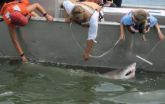SHERMAN, CT, October 18, 2012 (Press-News.org) A new study of 377 Americans highlights the growing concern of using public Wi-Fi Hotspots. The survey, conducted by the Identity Theft Resource Center (ITRC) in conjunction with PRIVATE WiFi, revealed that 79% of respondents believe that using a free Wi-Fi connection can lead to identity theft. 45% of respondents said they were concerned about their security when using a public hotspot and 15% indicated that they were "very concerned." 44% of respondents weren't aware that there is a way to protect their sensitive information while using a public hotspot.
In addition, nearly 70% of those surveyed stated that they knew a password used to gain Internet access in a public hotspot was not sufficient enough to keep their data secure. 24% stated that they made online purchases in a public hotspot, and 57% admitted to accessing confidential work-related information while using a public hotspot.
"We live in a data-driven society where we want to have access to everything at all times, from anywhere- no matter the cost," said Kent Lawson, founder and CEO of PRIVATE WiFi. "I think the most disconcerting thing we learned from our study is that there is a significant measure of concern when it comes to public Wi-Fi security, yet very few realize that there is a simple, yet effective solution in a personal VPN like PRIVATE WiFi."
"Our study revealed that only 27% of respondents use a VPN to protect themselves. While there are various ways to secure your data and identity in a public Wi-Fi hotspot, the most reliable solution that we at the ITRC recommend is a personal VPN," said Rex Davis, director of operations at the ITRC. "There is no doubt that Wi-Fi hotspots are vulnerable, and VPN technology offers the greatest level of protection."
These results come just in time for National Cyber Security Awareness Month, which is designed to engage and educate public and private sector partners through events and initiatives with the goal of raising awareness about cyber security and increasing the resiliency of the nation in the event of a cyber incident. October 2012 marks the ninth annual National Cyber Security Awareness Month sponsored by the Department of Homeland Security in cooperation with the National Cyber Security Alliance (NCSA) and the Multi-State Information Sharing and Analysis Center (MS-ISAC).
For more results and information on the survey, Wi-Fi safety tips and the survey infographic, please visit: http://www.privatewifi.com/is-public-wifi-safe-infographic/
About Private Communications Corporation
Private Communications Corporation is a security technology company that protects personal data and information online. PRIVATE WiFi, the company's flagship software product, opens an encrypted pathway for computer data across unencrypted WiFi networks, ensuring online privacy for those without access to virtual private networks (VPNs). Founded by software entrepreneur Kent Lawson, Private Communications Corporation is headquartered in Sherman, CT. For more information, visit us at http://www.privatewifi.com and for articles and other online privacy resources, please visit www.private-i.com. You can also connect with us on Facebook at http://www.facebook.com/privatewifi.
Private WiFi protects your identity and sensitive information by becoming invisible on any public WiFi network. For more information, please contact us at 1-888-525-3078.
About ITRC
Identity Theft Resource Center (ITRC) is a nonprofit, nationally respected organization dedicated exclusively to the understanding of identity theft and related issues. The ITRC provides victim and consumer support as well as public education. The ITRC also advises governmental agencies, legislators, law enforcement, and businesses about the evolving and growing problem of identity theft. For more information, please visit www.idtheftcenter.org.
Almost 80% Believe Free Wi-Fi Can Lead to Identity Theft, Study Finds
A recent survey by the Identity Theft Resource Center in conjunction with PRIVATE WiFi indicates that a personal VPN is your best line of defense.
2012-10-18
ELSE PRESS RELEASES FROM THIS DATE:
Children with ADHD find medication frees them to choose between right and wrong, study suggests
2012-10-17
Children living with attention deficit hyperactivity disorder (ADHD) tend to feel that they benefit from medication to treat the condition and do not feel that the medication turns them into 'robots', according to a report published today. In fact, they report feeling that medication helps them to control their behaviour and make better decisions. The study, which gives a voice to the children themselves, provides valuable insights into their experiences and the stigma they face.
The ADHD VOICES – Voices on Identity, Childhood, Ethics and Stimulants – study has worked ...
Where the deer and the antelope cross
2012-10-17
The locations of the structures completed this fall were informed by data collected by WCS, the Wyoming Cooperative Fish and Wildlife Research Unit, and the Wyoming Game and Fish Department, and identified the pronghorn's preferred migration routes and highway crossing points.
WCS has long studied an approximately 93-mile (150 km) migration of pronghorn between wintering grounds in the Upper Green River Basin and summering grounds in Grand Teton National Park (GTNP)—a migration corridor known as the "Path of the Pronghorn." WCS worked with many partners including ...
New insights into how genetic differences influence breast cancer risk from low-dose radiation
2012-10-17
Scientists from the U.S. Department of Energy's Lawrence Berkeley National Laboratory (Berkeley Lab) have identified tissue mechanisms that may influence a woman's susceptibility or resistance to breast cancer after exposure to low-dose ionizing radiation, such as the levels used in full-body CT scans and radiotherapy.
The research could lead to new ways to identify women who have higher or lower risks of breast cancer from low-dose radiation. Such a predictive tool could help guide the treatment of cancer patients who may be better served by non-radiation therapies.
The ...
Overcoming memories that trigger cocaine relapse
2012-10-17
Researchers from the University of Wisconsin-Milwaukee (UWM) have identified mechanisms in the brain responsible for regulating cocaine-seeking behavior, providing an avenue for drug development that could greatly reduce the high relapse rate in cocaine addiction.
The research reveals that stimulation of certain brain receptors promotes inhibition of cocaine-associated memories, helping addicts to stop drug use. This inhibition is achieved through enhancing a process called "extinction learning," in which cocaine-associated memories are replaced with associations that ...
Shark social networking
2012-10-17
University of Delaware researchers are using an underwater robot to find and follow sand tiger sharks that they previously tagged with transmitters. The innovative project is part of a multi-year partnership with Delaware State University to better understand the behavior and migration patterns of the sharks in real time.
"In the past week our new, specially equipped glider OTIS – which stands for Oceanographic Telemetry Identification Sensor – detected multiple sand tiger sharks off the coast of Maryland that were tagged over the past several years," said Matthew Oliver, ...
Fresh out of high school, 2 Chicago students present research at AAPS Annual Meeting
2012-10-17
Arlington, Va. — Two Chicago high school students have developed a novel treatment method to reduce the negative effects of Fetal Alcohol Syndrome (FAS) and a new understanding of genetics behind the disease. This research is being presented at the 2012 American Association of Pharmaceutical Scientists (AAPS) Annual Meeting and Exposition in Chicago, Ill., Oct. 14 – 18. More than 8,000 attendees are expected at the largest conference dedicated to the pharmaceutical sciences.
Ayana Jamal and Ariella Hoffman-Peterson, 2012 graduates of Niles North High School in Skokie, ...
Prolonged formula feeding, delay in solid foods associated with increased risk for pediatric ALL
2012-10-17
This abstract will be presented at a press conference hosted by program chairperson Cory Abate-Shen, Ph.D., the Michael and Stella Chernow professor of urological oncology and associate director of the Herbert Irving Comprehensive Cancer Center at Columbia University Medical Center, in the San Simeon AB Room on the fourth floor of the Hilton Anaheim at 7:30 a.m. PT on Wednesday, Oct. 17. Reporters who cannot attend in person can call in using the following information:
U.S./Canada (toll free): 1 (800) 446-2782
International (toll call): 1 (847) 413-3235
ANAHEIM, ...
Study finds vegetable-derived compound effective in treating triple-negative breast cancer
2012-10-17
Arlington, Va. — A new compound created from a rich source in vegetables including broccoli and brussel sprouts has been developed to combat triple-negative breast cancer (TNBC). This research is being presented at the 2012 American Association of Pharmaceutical Scientists (AAPS) Annual Meeting and Exposition, the world's largest pharmaceutical sciences meeting, in Chicago, Ill., on Oct. 14 – 18, during Breast Cancer Awareness Month.
TNBC accounts for approximately 15-20 percent of all breast cancer cases in the U.S. It is one of the most aggressive forms of breast ...
Novel chewing gum formulation helps prevent motion sickness
2012-10-17
Arlington, Va. — A new prototype for medicated chewing gum has been developed for motion sickness that may offer many advantages over conventional oral solid dosage forms. About 33 percent of people are susceptible to motion sickness in mild circumstances and 66 percent are affected in more severe conditions. This research is being presented at the 2012 American Association of Pharmaceutical Scientists (AAPS) Annual Meeting and Exposition in Chicago, Ill., Oct. 14 – 18, an international event anticipating more than 8,000 attendees.
Lead researcher Mohsen Sadatrezaei of ...
Discovery of two opposite ways humans voluntarily forget unwanted memories
2012-10-17
If only there were a way to forget that humiliating faux pas at last night's dinner party. It turns out there's not one, but two opposite ways in which the brain allows us to voluntarily forget unwanted memories, according to a study published by Cell Press October 17 in the journal Neuron. The findings may explain how individuals can cope with undesirable experiences and could lead to the development of treatments to improve disorders of memory control.
"This study is the first demonstration of two distinct mechanisms that cause such forgetting: one by shutting down ...
LAST 30 PRESS RELEASES:
Spiritual practices strongly associated with reduced risk for hazardous alcohol and drug use
Novel vaccine protects against C. diff disease and recurrence
An “electrical” circadian clock balances growth between shoots and roots
Largest study of rare skin cancer in Mexican patients shows its more complex than previously thought
Colonists dredged away Sydney’s natural oyster reefs. Now science knows how best to restore them.
Joint and independent associations of gestational diabetes and depression with childhood obesity
Spirituality and harmful or hazardous alcohol and other drug use
New plastic material could solve energy storage challenge, researchers report
Mapping protein production in brain cells yields new insights for brain disease
Exposing a hidden anchor for HIV replication
Can Europe be climate-neutral by 2050? New monitor tracks the pace of the energy transition
Major heart attack study reveals ‘survival paradox’: Frail men at higher risk of death than women despite better treatment
Medicare patients get different stroke care depending on plan, analysis reveals
Polyploidy-induced senescence may drive aging, tissue repair, and cancer risk
Study shows that treating patients with lifestyle medicine may help reduce clinician burnout
Experimental and numerical framework for acoustic streaming prediction in mid-air phased arrays
Ancestral motif enables broad DNA binding by NIN, a master regulator of rhizobial symbiosis
Macrophage immune cells need constant reminders to retain memories of prior infections
Ultra-endurance running may accelerate aging and breakdown of red blood cells
Ancient mind-body practice proven to lower blood pressure in clinical trial
SwRI to create advanced Product Lifecycle Management system for the Air Force
Natural selection operates on multiple levels, comprehensive review of scientific studies shows
Developing a national research program on liquid metals for fusion
AI-powered ECG could help guide lifelong heart monitoring for patients with repaired tetralogy of fallot
Global shark bites return to average in 2025, with a smaller proportion in the United States
Millions are unaware of heart risks that don’t start in the heart
What freezing plants in blocks of ice can tell us about the future of Svalbard’s plant communities
A new vascularized tissueoid-on-a-chip model for liver regeneration and transplant rejection
Augmented reality menus may help restaurants attract more customers, improve brand perceptions
Power grids to epidemics: study shows small patterns trigger systemic failures
[Press-News.org] Almost 80% Believe Free Wi-Fi Can Lead to Identity Theft, Study FindsA recent survey by the Identity Theft Resource Center in conjunction with PRIVATE WiFi indicates that a personal VPN is your best line of defense.



